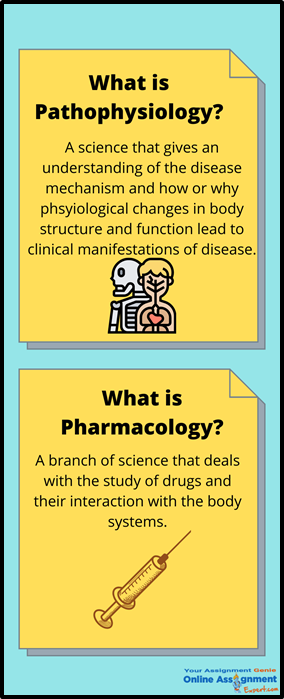Are you struggling with your pathophysiology and pharmacology assignments and need expert guidance? Get in touch with our pathophysiology and pharmacology assignment help to score HD grades in your nursing assignments. Online Assignment Expert is a one-stop solution for all your academic woes. We are backed by a team of top-rated subject matter experts who are highly proficient in their subject domains. They can provide you with customized guiding sessions to easily understand the most complex pharmacology and pathophysiology.
Pharmacology is the science of medicine and biology that deals with the study of drugs and their potential effects on living tissues. Pathophysiology is the study of the unbalanced functioning of an organ or the whole organism due to a disease. Pathophysiology and pharmacology altogether form a comprehensive picture of contemporary nursing practice. Nurses are expected to understand pharmacology and pathophysiology concepts to undertake appropriate diagnoses, provide quality patient care, and educate the patients about their prescribed medications.
Both pharmacology and pathophysiology are essential to the medical and nursing programs and undergraduate and postgraduate biology programs. Doctors and nurse practitioners diagnose disorders after evaluating the pathophysiology of the body. To prescribe medications for the concerned disorder, doctors and nurses should be competent in pharmacology and be aware of the latest drug discoveries. Students pursuing medical and nursing courses are provided with pathophysiology and pharmacology assignments to improve and check their understanding of the pathophysiological processes involved in various disorders and the potential drug effects on the diseased tissue or organ.

People often discerned pharmacology and pharmacy as the same disciplines. However, pharmacology is an entirely separate discipline of health sciences that explains how a drug affects the body systems and responds to that drug. It encompasses the source of a drug, its chemical and biological properties, and its therapeutic uses. The drug effects can be therapeutic or toxic, depending upon several factors.
Pharmacologists have a keen interest in therapeutics, which mainly focuses on the potential effects of a drug and other chemical agents to cure the symptoms of a disease, and toxicology, which is the study of toxic or harmful effects of drugs and other chemical agents on the body system.
Here are some of the crucial branches of pharmacology covered by our NURS2003 help expert:
Pathophysiology, another necessary nursing discipline, is derived from the intersection of two main medical branches: pathology and physiology. Pathology refers to studying and diagnosing a disorder by carefully examining the cells, tissues, organs, and bodily fluids. Physiology is the study of the body's physical, biochemical, and mechanical functions. Altogether, pathophysiology refers to the study of abnormal psychological functioning of the body. Here we have discussed four main interrelated elements of pathophysiology.
Besides these topics, if you have any subject-related queries, you can contact our NURS2003 help experts to avail professional guidance.
As a nursing student, pathophysiology and pharmacology will enable you to understand the pathological basis of disease and related drug treatment. You will get to know more about the prerequisite concepts, such as etiology and pathogenesis of the disorder, which will enable you to correctly diagnose a disorder and understand the exact mechanism of disease progression. In Australia, several renowned universities offer programs related to pharmacology and pathophysiology, such as the University of Sydney, Flinders University, Federation University, Griffith University, and the University of South Australia. One of the popular courses in pathophysiology and pharmacology is NURS2003. Let's have a look at some of the learning outcomes of this program:
If you are also pursuing NURS2003 and looking for expert guidance in assignment writing, you can surely rely on us as we have a specialized team of NURS2003 experts.
As per the views of Potter and Perry (2017), the essence of critical thinking is a nurse's ability to respond to what they know and understand. Pathophysiology lays the foundation of nursing practice and enables you to think more like a nurse. It also enables you to deeply understand other related concepts such as fluid mechanics and pharmacology. For this reason, nursing students need to understand the critical concepts of pathophysiology and implement this knowledge at the bedside. If you fail to understand the pathophysiology of a disorder, you will not reason and establish the correct nursing practice.
As well all know, nurses play a vital role in administering medications correctly to patients. Thus, a nurse must have a solid understanding of pharmacology and potential life-threatening interactions between the drugs. As a nurse, you have to check the medication dosage, administration route, and the timings of the drug administration. It isn't easy to know about every single drug off the top of your head. Basic knowledge of drug classes, broader classification of the medications, and knowing where to find this information may help you better understand pharmacology (Madigan, 2021).
Get the top-class session from our NURS2003 help expert to get top grades and stay ahead of the curve!

Get 24x7 instant assistance whenever you need.

Get affordable prices for your every assignment.

Assure you to deliver the assignment before the deadline

Get Plagiarism and AI content free Assignment

Get direct communication with experts immediately.
Get
500 Words Free
on your assignment today
Discover unlimited perks once you entrust that we write your essay for you.

Do not let assignment submission deadlines stress you out. Explore our professional assignment writing services with competitive rates today!
Secure Your Assignment!